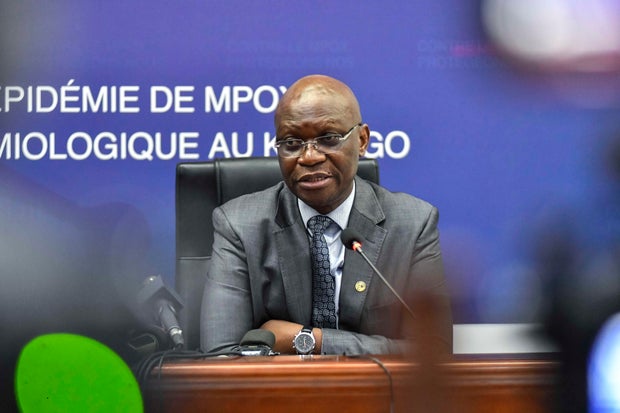CBS News
U.S. officials warn doctors about dengue as worldwide cases surge

U.S. health officials on Tuesday warned doctors to be alert for dengue cases as the tropical disease breaks international records.
The virus, which is spread by mosquitoes, has been surging worldwide, helped by climate change. In barely six months, countries in the Americas have already broken calendar-year records for dengue cases.
The World Health Organization declared an emergency in December, and Puerto Rico declared a public health emergency in March.
Dengue remains less common in the continental United States, but in the 50 states so far this year there have been three times more cases than at the same point last year. Most were infections that travelers got abroad, and officials note there is no evidence of a current outbreak. But they also warn that local mosquitos pose a threat.
In its health alert Tuesday, the Centers for Disease Control and Prevention advised doctors to know the symptoms, ask questions about where patients recently traveled and consider ordering dengue tests when appropriate.
“Global incidence of dengue in 2024 has been the highest on record for this calendar year,” the CDC said in its advisory, adding that so far this year, countries in the Americas have reported more than 9.7 million cases, twice as many as the 4.6 million cases reported for the whole of 2023.
Often referred to as dengue fever or “break-bone fever,” due to pain being a major symptom, dengue (pronounced DEHN’-gay) is caused by a virus spread by a type of warm weather mosquito that is expanding its geographic reach because of climate change, experts say.
About 1 in 4 people infected with dengue will get sick, the CDC says, with symptoms ranging from mild to extreme. About 1 in 20 people who get sick will develop severe dengue, which can result in shock, internal bleeding and even death.
Repeated infections can be especially dangerous.
APHOTOGRAFIA / Getty Images
There are four types of dengue virus, simply known as 1, 2, 3 and 4. When someone is first infected, their body builds antibodies against that type for life. If they get infected with another type of dengue, the antibodies from the first infection may fail to neutralize the second type —and actually can help the virus enter immune cells and replicate.
That’s a concern in Puerto Rico, which for the last two decades has been widely exposed to type 1. Last month, the island reported its first dengue death of the year.
“We’re currently seeing is increases in the cases due to dengue 2 and dengue 3, for which the population has very little immunity,” said Dr. Gabriela Paz-Bailey, the Puerto-Rico-based chief of the CDC’s dengue branch.
There is no widely available medicine for treating dengue infections.
Vaccines have been tricky. U.S. officials in 2021 recommended one vaccine, made by Sanofi Pasteur. The three-dose vaccine is built to protect against all four dengue types and is recommended only for children ages 9 to 16 who have laboratory evidence of an earlier dengue infection and who live in an area —like Puerto Rico— where dengue is common.
Given those restrictions and other issues, it hasn’t been widely used. As of late last month, only about 140 children had been vaccinated in Puerto Rico since shots became available there in 2022, and Sanofi Pasteur has told the CDC it is going to stop making the vaccine.
A different vaccine made by the Tokyo-based pharmaceutical company Takeda is not currently licensed in the U.S. Others are in development.
Across the world, more than 6.6 million infections were reported by about 80 countries last year. In the first four months of this year, 7.9 million cases and 4,000 deaths have been reported, according to the World Health Organization. It’s been particularly intense in the Americas, including in Brazil and Peru.
Sarah Pabst/Bloomberg via Getty Images
In the United States, the numbers have been far more modest —about 3,000 cases last year in U.S. states and territories. But it was the worst in a decade, and included more infections that occurred locally, courtesy of native mosquitoes. Most were in Puerto Rico, but about 180 were in three U.S. states — Florida, Texas and California.
So far this year, there have been nearly 1,500 locally acquired U.S. cases, nearly all of them in Puerto Rico.
CBS News
2 sisters, 7 years apart in age, also receive heart transplants 7 years apart in Chicago

CHICAGO (CBS) — Two sisters have grateful hearts after they both received heart transplants at the same age—seven years apart.
Younger sister Meredith Everhart and older sister Abbey Cannon are now bonded by a genetic condition and a second chance at life.
“What’s ironic is that when she needed a heart transplant, was exactly the same age I needed a heart transplant,” said Cannon. “Seven years apart in age, seven years apart within 30 days of transplant, and our birthdays are within 30 days.”
The sisters share a special bond of getting a second chance at life, which they both received at the age of 38 years old.
Both sisters suffer from hypertrophic cardiomyopathy—otherwise known as HCM.
The genetic condition is a form of heart disease that causes the heart muscle to thicken.
In 2012, Cannon had chest pain. She was misdiagnosed in Nashville, Tennessee, and got a second opinion at Northwestern Medicine in 2016.
“Within six months, I was inpatient on an aortic balloon pump waiting for a heart,” Cannon said. “I ended up getting my heart 32 days later, So my date is February 27, 2017.”
Just months after Cannon’s transplant, Everhart was diagnosed with HCM too. She tried medication and participated in clinical trials, but her condition kept getting worse.”
“For me, it was, she’s right—I was in denial for a long time,” said Everhart, “and I didn’t want to be sick. I was in my 20s. I was in my early 30’s. I was like, this is not happening. I saw how bad she suffered.”
In May 2022, Everhart got COVID-19, and it sent her into heart failure.
She was added to the transplant list one year later.
“I got the call on January 29 of this year, 2024, and it’s been a journey,” Everhart said. “It’s been fantastic though. Northwestern has been great.”
Cannon said she can’t stress enough how important it is to become an organ donor.
“Had we not had someone that gave that most selfless gift, neither of us would be here,” she said.
CBS News
Congo says mystery disease behind dozens of deaths of women and children finally identified as severe malaria

Johannesburg — For weeks it was dubbed simply “Disease X.” But the mysterious flu-like disease that has killed more than 143 people — mainly women and young children — in the Democratic Republic of Congo has finally been identified.
“The mystery has finally been solved,” Congo’s health ministry declared in a statement on Tuesday. “It’s a case of severe malaria in the form of a respiratory illness.”
The health agency said malnutrition in the hardest-hit region had weakened the local population’s immunity, leaving them more vulnerable to the disease. People who contracted the malaria infection have exhibited symptoms including headache, fever, cough and body ache.
The Congo’s health minister had told journalists the country was on “maximum alert” over the spread of the previously unidentified disease, and health officials told CBS News in early December that the remoteness of the epicenter of the outbreak and lack of a diagnosis made it difficult to launch a concerted response.
Samy Ntumba Shambuyi/AP
At least 592 cases were reported after the alert was first raised by Congo’s health ministry on Oct. 29. The ministry said the disease had a fatality rate of 6.25%. More than half of the deaths recorded were children younger than five who were severely malnourished when they contracted the disease, according to the World Health Organization.
At a press briefing on Dec. 10, WHO Director-General Tedros Adhanom Ghebreyesus said 10 out of 12 samples from patients suffering from the mysterious disease had tested positive for malaria, but he said they were still testing at the time for other diseases.
The Congolese government had sent a rapid intervention team to the Kwango province, 435 miles southeast of capital city Kinshasa, consisting of epidemiologists and other medical experts. Their objective was to identify the disease and mount a suitable response. Government officials had earlier warned locals to avoid touching people infected with the illness or the bodies of those who had died.
Congo has suffered from many disease outbreaks in recent years, including typhoid, malaria and anemia. The country has also grappled with an mpox outbreak, with more than 47,000 suspected cases and over 1,000 suspected deaths from the disease, according to the WHO.
Anti-malaria medicine provided by the WHO was being distributed at local health centers in Congo, and WHO officials said more medical supplies were due to arrive in the country Wednesday.
It’s the rainy season in Congo, which often sees a rise in malaria cases, and will certainly complicate treating those most at risk.
CBS News
Russia says suspect detained in killing of Gen. Igor Kirillov, head of Russian chemical weapons unit

Moscow — Russia’s security service said Wednesday that it had detained a suspect in the killing of a senior general in a Moscow bomb blast. The suspect was described as an Uzbek citizen whom the agency said had been recruited by Ukrainian intelligence services.
Ukrainian security sources told CBS News on Monday that the Security Service of Ukraine (SBU) was behind the explosion that killed Lt. General Igor Kirillov. The claim couldn’t be independently verified, but Russian officials quickly vowed to take revenge against Ukraine’s leaders.
Russia’s Federal Security Service didn’t name the suspect, but it said he was born in 1995. According to an FSB statement, the suspect said he was recruited by Ukrainian special services.
AFPTV / AFP via Getty Images
“Kirillov was a war criminal and an absolutely legitimate target, since he gave orders to use prohibited chemical weapons against the Ukrainian military,” an informed source in the SBU asserted to CBS News. “Such an inglorious end awaits everyone who kills Ukrainians. Retribution for war crimes is inevitable.”
Kirillov was killed by a bomb hidden in an electric scooter outside his apartment building in Moscow, a day after Ukraine’s security service leveled criminal charges against him. His assistant also died in the attack.
The FSB said the suspect had been promised a reward of $100,000 and permission to move to a European Union country in exchange for killing Kirillov. It said that, acting on instructions from Ukraine, the suspect traveled to Moscow, where he picked up a homemade explosive device. He then placed the device on an electric scooter and parked it at the entrance of the residential building where Kirillov lived.
The suspect then rented a car to monitor the location and set up a camera that livestreamed video from the scene to his handlers in the central Ukrainian city of Dnipro. When Kirillov was seen leaving the building, the suspect detonated the bomb.
According to the FSB’s statement, the suspect faces “a sentence of up to life imprisonment.”
Kirillov, 54, was the chief of the Russian military’s radiological, biological and chemical protection forces. Either Kirillov himself or his military unit were sanctioned by several countries, including the U.S., Britain and Canada, for the alleged use of chemical weapons on the battlefield in Ukraine. On Monday, Ukraine’s SBU had opened a criminal investigation against him, accusing him of directing the use of banned chemical weapons.
Maxim Shemetov/REUTERS
Ukraine’s SBU has said it recorded more than 4,800 occasions when Russia used chemical weapons on the battlefield since President Vladimir Putin launched his full-scale invasion in February 2022. In May, the U.S. State Department announced sanctions against Kirillov’s unit, saying the U.S. had recorded the use of chloropicrin, a poison gas first deployed in World War I, against Ukrainian troops.
Russia has denied using any chemical weapons in Ukraine and, in turn, has accused Kyiv of using toxic agents in combat, and Kirillov was allegedly behind the spread of that propaganda.
Kirillov, who had been in his post since April 2017, was accused by the U.S. government of helping to spread disinformation about biological weapons and research.
In March 2023, about a year into Russia’s full-scale invasion, the U.S. State Department said Kirillov had “significantly increased his media engagement” to issue repeated, baseless claims that the U.S. government had been involved in creating both the mpox virus and COVID-19, and that the U.S. “is developing biological weapons able to selectively target ethnic groups.”
“The U.S. Government is concerned that this false narrative may be a prelude for a false-flag operation, where Russia itself uses biological, chemical, or nuclear weapons in Ukraine, and then attempts to blame it on Ukraine and/or the United States,” the State Department said at the time.
Sefa Karacan / Anadolu via Getty Images
The bomb used in Tuesday’s attack was triggered remotely, according to Russian news reports. Images from the scene showed shattered windows and scorched brickwork.
Russia’s top state investigative agency said it’s looking into Kirillov’s death as a case of terrorism, and officials in Moscow vowed to punish Ukraine.














